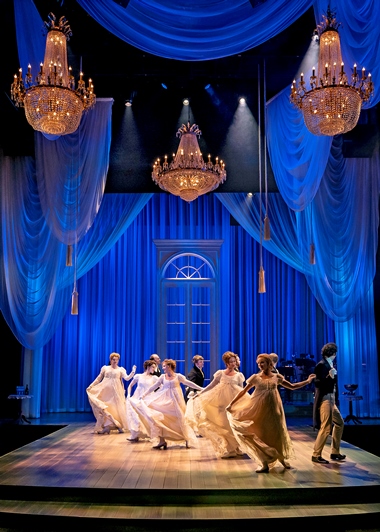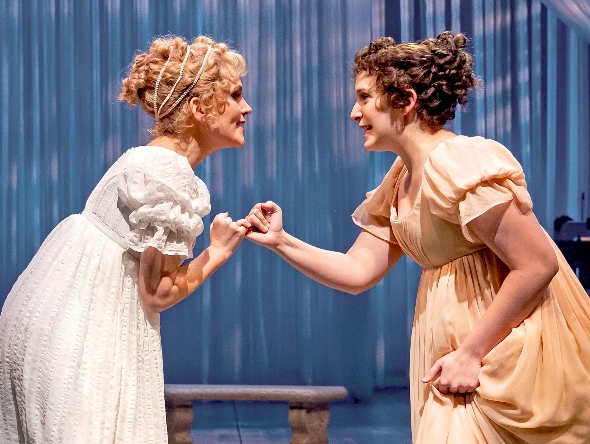‘Emma’ at Chicago Shakespeare Theater: Sans reason or accountability (or poetry or music)

Mr. Knightley (Brad Standley) is fascinated, if also generally vexed, by Emma (Lora Lee Gayer) and her attempts at matchmaking in the musical at Chicago Shakespeare Theater. (Liz Lauren photos)
Review: “Emma,” a musical by Paul Gordon, after Jane Austen’s novel. At Chicago Shakespeare Theater through March 15. ★★
By Lawrence B. Johnson
Imagine the sharp, slashing repartee between Beatrice and Benedick, in Shakespeare’s “Much Ado About Nothing,” if Beatrice brought no intellectual edge to the fray, and you have the eponymous figure in “Emma,” the mildly diverting, perfectly harmless and utterly forgettable musical in mid-flight at Chicago Shakespeare Theater.
The most dismissive phrase I can muster for such a display of vacuous charm is that it’s a cute show. I’ll give it that; tedious almost to the crushing point, but cute. Sondheim it is not. More like Paul Simon’s “all right in sort of a limited way for an off night.”
“Emma,” based on Jane Austen’s book by the same title, is the latest of many retellings of this story about a vain, headstrong and privileged young woman who imagines herself to be a gifted matchmaker, but who lacks self-knowledge: Even when she responds to her heart’s first impulse, she gets it wrong.
You may recall novelist Melvin Udall’s rejoinder in the film “As Good As It Gets” when asked (by a woman) how he does women so well: “I think of a man. And I take away reason and accountability.” I give you the Emma of this unaccountable musical.
Her Benedick – her sober and critical foil – is Mr. Knightley, ever present and usually squabbling with Emma but never betraying a romantic interest in her, just as she never regards him except as a scrappy friend.
Lora Lee Gayer makes a lovely Emma, and one might easily grasp Mr. Knightley’s long-simmering passion for her – if she only had a brain. But the musical as it unfolds at CST, directed by Barbara Gaines, portrays her as air-headed to the end, when the poor sot Mr. Knightley (the properly reserved and astute Brad Standley) suddenly and inexplicably prostrates himself before her in an abject protestation of love. What’s the man thinking?
But the problem with “Emma” runs much deeper than that. I have suggested this show would not be mistaken for Sondheim. Its lyrics can hardly be taken for poetry, period. The song texts are simplistic, obvious and repetitive. Wit here subsists at an adolescent level. The music itself is not much better. Oddly, the vocal performances outshine the material at hand.
Despite a stageful of supporting characters, there’s scarcely a sympathetic soul to be found among this lot of stock figures and caricatures. One way or another, Emma manages to torment them all.
There’s simpering, fawning, diffident Harriet Smith, played by Ephie Aardema in a palpitating performance that captures all of that. Harriet fatuously believes herself to be Emma’s good friend and, on Emma’s earnest counsel, rejects a plain but honest country lad (Ian Geers) who adores her and wants to marry her. And what’s Emma’s (ulterior) angle? She thinks an outwardly fine fellow of inwardly dubious merit, Frank Churchill (strutted about by Devin De Santis), would be a better match – or perhaps just a better catch.
In something of a preliminary sketch for the feckless clergyman Mr. Collins in “Pride and Prejudice” (which followed “Emma”), and his unwanted proposal to Elizabeth Bennet, this romantic arabesque gives us Mr. Elton (Dennis William Grimes), a likewise bumbling preacher who gives Emma the opportunity to reject him.
The most conspicuous squandering of stage prowess is Larry Yando’s walk-through as Emma’s aging, whining father: “I don’t like change.” I stopped counting after his third such pronouncement, though by then I believed him.
If the substance of this gauzy affair matched its visual aspect, it would be rewarding indeed. Scott Davis’ grand chandeliered and draped set design is gorgeous, a real eye-popper the moment you walk into the theater. And Gaines keeps the characters moving in a graceful flow. But it is an inescapably shallow, weightless enterprise that plays out to indifferent music and a flat, predictable text.
This show sent me away pining for the acuity of Elizabeth Bennet, the brittle brilliance of Beatrice – the pointed barbs of Kate the Curs’d. As it was, I felt like I’d narrowly escaped a digression among the criminally inane.
Related Link:
- Performance location, dates and times: Details at TheatreInChicago.com




